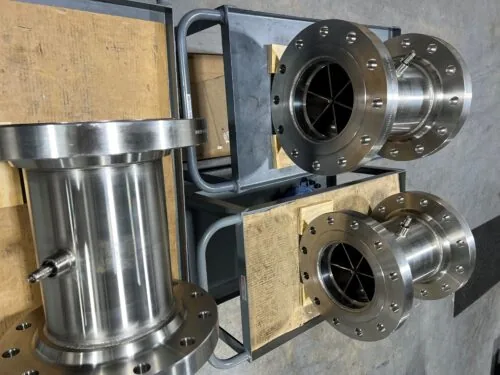Stainless Steel vs. PVC Flow Meters: Why Stainless Steel is the Superior Choice
When selecting a flow meter, material of construction is a critical factor that impacts performance, longevity, and reliability. Two commonly used materials in flow meter construction are stainless steel and PVC. While PVC offers affordability and chemical resistance in certain applications, stainless steel provides superior durability, precision, and versatility across a wide range of industrial environments. For those seeking long-term performance and reliability, stainless steel flow meters emerge as the clear choice.
Durability and Longevity
Stainless steel flow meters are built to withstand harsh conditions, making them an ideal choice for industrial, commercial, and municipal applications. Unlike PVC, which can degrade over time due to UV exposure, temperature fluctuations, and mechanical stress, stainless steel is highly resistant to wear and tear. This durability translates into a longer service life, reducing the need for frequent replacements and maintenance.
Pressure and Temperature Resistance
One of the key advantages of stainless steel flow meters is their ability to handle high-pressure and high-temperature applications. Stainless steel can withstand extreme conditions without compromising performance, making it the preferred choice for industries such as oil and gas, chemical processing, and manufacturing. In contrast, PVC flow meters have lower pressure and temperature tolerances, which can lead to deformation or failure under demanding conditions.
Chemical Compatibility and Corrosion Resistance
While PVC is known for its resistance to certain acids and corrosive chemicals, stainless steel offers a broader range of chemical compatibility. Stainless steel, particularly grades like 316 stainless steel, is highly resistant to corrosion from water, steam, petroleum-based fluids, and many aggressive chemicals. This makes stainless steel flow meters suitable for industries where exposure to various fluids is common, such as food and beverage processing, pharmaceuticals, and water treatment. Additionally, stainless steel does not degrade over time like PVC, ensuring consistent performance even in challenging environments.
Precision and Accuracy
Accurate flow measurement is essential for process control, regulatory compliance, and operational efficiency. Stainless steel flow meters provide superior accuracy compared to PVC models, especially in demanding applications where precision is critical. PVC flow meters may experience fluctuations due to temperature changes, mechanical stress, or chemical exposure, which can compromise measurement accuracy over time. Stainless steel, with its stable structure and minimal expansion or contraction, ensures precise readings even in extreme conditions.
Mechanical Strength and Structural Integrity
Industrial and commercial flow measurement applications often involve mechanical stress from vibrations, impacts, or fluctuating flow rates. Stainless steel flow meters offer exceptional mechanical strength, maintaining their structural integrity even under heavy loads or sudden pressure surges. PVC, on the other hand, is more prone to cracking, warping, or breaking under stress, leading to potential leaks or operational failures.
Hygienic and Sanitary Applications
In industries such as food and beverage, pharmaceuticals, and biotechnology, hygiene is a top priority. Stainless steel is a non-porous material that resists bacterial growth and is easy to clean and sterilize. It meets stringent sanitary standards, making it the material of choice for flow meters used in processing applications where contamination must be avoided. PVC, while chemically resistant, can develop micro-cracks over time, which can harbor bacteria and compromise cleanliness.
Environmental Impact and Sustainability
Sustainability and environmental responsibility are growing concerns in industrial operations. Stainless steel is a highly recyclable material, reducing waste and supporting eco-friendly initiatives. While PVC is recyclable to some extent, its degradation over time, especially when exposed to sunlight and harsh chemicals, can lead to environmental concerns. Additionally, the production and disposal of PVC can release harmful compounds, whereas stainless steel offers a more sustainable solution with minimal ecological impact.
Cost Considerations: Upfront vs. Long-Term Investment
It is true that PVC flow meters generally have a lower initial cost than stainless steel models. However, when considering the total cost of ownership, stainless steel proves to be the more cost-effective choice in the long run. With a longer lifespan, reduced maintenance requirements, and fewer replacements needed, stainless steel flow meters offer greater return on investment over time. Businesses that prioritize reliability and operational efficiency recognize that the initial investment in stainless steel pays off with reduced downtime and maintenance expenses.
Versatility Across Industries
Stainless steel flow meters are widely used across a diverse range of industries, including:
- Oil and Gas: Withstanding high pressures and corrosive fluids.
- Chemical Processing: Offering broad chemical compatibility and durability.
- Food and Beverage: Ensuring sanitary conditions and regulatory compliance.
- Pharmaceuticals: Providing precision measurement in sterile environments.
- Water Treatment: Resisting corrosion and maintaining performance over time.
PVC flow meters, while useful for basic water applications and low-pressure systems, lack the strength and adaptability needed for more demanding industries.
Conclusion: Stainless Steel for Reliability and Performance
When evaluating stainless steel vs. PVC flow meters, it becomes clear that stainless steel is the superior choice for most industrial and commercial applications. With its unmatched durability, pressure and temperature resistance, chemical compatibility, and precision, stainless steel flow meters provide long-term value and reliability. While PVC flow meters may serve well in limited, low-risk environments, stainless steel offers the performance and longevity needed to support critical operations. Investing in stainless steel flow meters ensures consistent, accurate measurements while minimizing maintenance costs and operational risks, making them the best choice for businesses that demand the highest quality and reliability.




